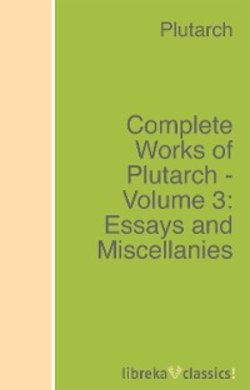Читать книгу Complete Works of Plutarch - Volume 3: Essays and Miscellanies - Plutarch - Страница 17
CHAPTER VI. WHENCE DID MEN OBTAIN THE KNOWLEDGE OF THE EXISTENCE AND ESSENCE OF A DEITY?
ОглавлениеThe Stoics thus define the essence of a god. It is a spirit intellectual and fiery, which acknowledges no shape, but is continually changed into what it pleases, and assimilates itself to all things. The knowledge of this deity they first received from the pulchritude of those things which so visibly appeared to us; for they concluded that nothing beauteous could casually or fortuitously be formed, but that it was framed from the art of a great understanding that produced the world. That the world is very resplendent is made perspicuous from the figure, the color, the magnitude of it, and likewise from the wonderful variety of those stars which adorn this world. The world is spherical; the orbicular hath the pre-eminence above all other figures, for being round itself it hath its parts like itself. (On this account, according to Plato, the understanding, which is the most sacred part of man, is in the head.) The color of it is most beauteous; for it is painted with blue; which, though little blacker than purple, yet hath such a shining quality, that by reason of the vehement efficacy of its color it cuts through such a space of air; whence it is that at so great a distance the heavens are to be contemplated. And in this very greatness of the world the beauty of it appears. View all things: that which contains the rest carries a beauty with it, as an animal or a tree. Also things which are visible to us accomplish the beauty of the world. The oblique circle called the Zodiac in heaven is with different images painted and distinguished:—
There are a thousand others that give us the suitable reflections of the beauty of the world. Thus Euripides:—
From this the knowledge of a god is conveyed to man; that the sun, the moon, and the rest of the stars, being carried under the earth, rise again in their proper color, magnitude, place, and times. Therefore they who by tradition delivered to us the knowledge and veneration of the gods did it by these three manner of ways:—first, from Nature; secondly, from fables; thirdly, from the testimony supplied by the laws of commonwealths. Philosophers taught the natural way; poets, the fabulous; and the political way is to be had from the constitutions of each commonwealth. All sorts of this learning are distinguished into these seven parts. The first is from things that are conspicuous, and the observation of those bodies which are in places superior to us. To men the heavenly bodies that are so visible did give the knowledge of the deity; when they contemplated that they are the causes of so great an harmony, that they regulate day and night, winter and summer, by their rising and setting, and likewise considered those things which by their influences in the earth do receive a being and do likewise fructify. It was manifest to men that the Heaven was the father of those things, and the Earth the mother; that the Heaven was the father is clear, since from the heavens there is the pouring down of waters, which have their spermatic faculty; the Earth the mother, because she receives them and brings forth. Likewise men considering that the stars are running (Greek omitted) in a perpetual motion, that the sun and moon give us the stimulus to view and contemplate (Greek omitted), they call them all gods (Greek omitted).
In the second and third place, they thus distinguished the deities into those which are beneficial and those that are injurious to mankind. Those which are beneficial they call Jupiter, Juno, Mercury, Ceres; those who are mischievous the Dirae, Furies, and Mars. These, which threaten dangers and violence, men endeavor to appease and conciliate by sacred rites. The fourth and the fifth order of gods they assign to things and passions; to passions, Love, Venus, and Desire; the deities that preside over things, Hope, Justice, and Eunomia.
The sixth order of deities are the ones made by the poets; Hesiod, willing to find out a father for those gods that acknowledge an original, invented their progenitors,—
upon which account this is called the fabulous. The seventh rank of the deities added to the rest are those which, by their beneficence to mankind, were honored with a divine worship, though they were born of mortal race; of this sort were Hercules, Castor and Pollux, and Bacchus. These are reputed to be of a human species; for of all beings that which is divine is most excellent, and man amongst all animals is adorned with the greatest beauty, is also the best, being adorned by virtue above the rest because of the gift of intellect: therefore it was thought that those who were admirable for excellence should resemble that which is the best and most beautiful.
